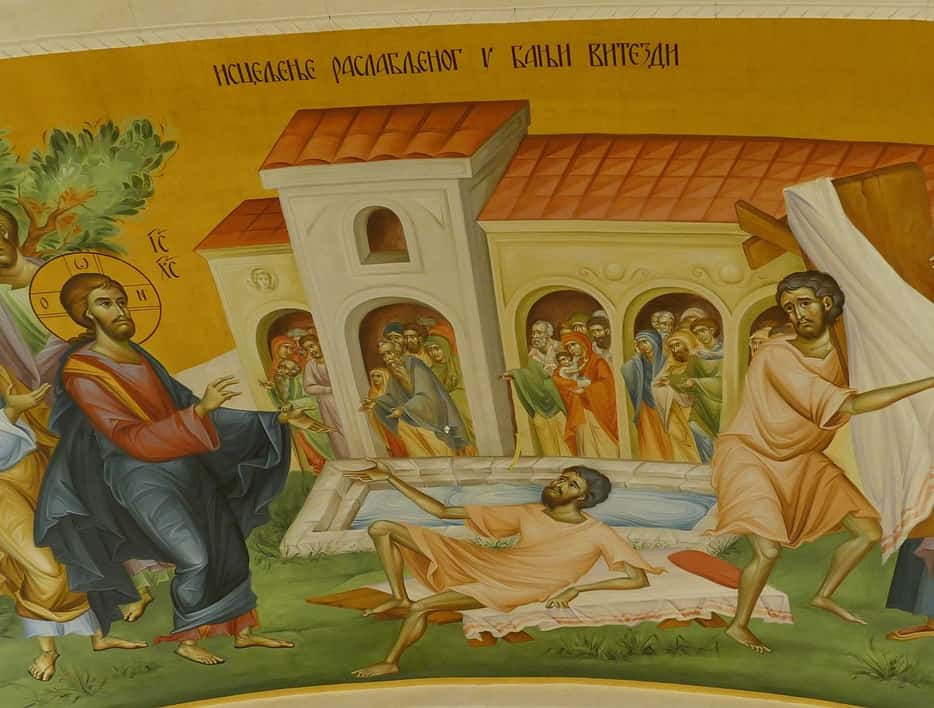
Table of Contents:
This teacher’s copy of the What are miracles? lesson plan is printer-friendly.
RESOURCES:
A board with 4 headings written on it:
- Recommended by another authority.
- The qualifications are approved.
- People can vouch for their character and usefulness.
- A demonstration of their ability to do the job.
STARTER:
[1] If an ordinary person in the street…
…goes up to someone else and says:
“I’m arresting you on suspicion of burglary.”
They would look at this person and say: “What authority, or right have you got to do that?”
And they answer: “Well, I’m saying it, and I live on ………… Road, (or …………. estate)!”
Then the reply may well be: “So what! You’ve got no authority to arrest me!”
But if a policeman had said: “I’m arresting you on suspicion of burglary.”
Then that would be wise to listen to him and follow his instructions because he has got the full authority of the law of this country.
[2] If this school was holding interviews…
…for more teachers, then anybody who came would have to show what experience and qualifications they had got so that they would do
the job properly.
Q. What would happen if they said: “I don’t have any qualifications, and I’ve never worked in a school”?
(Teacher’s note: Have your board with the 4 headings on it ready)
Let’s imagine that a teacher has come for a job, and they have got their C.V. with them.
This teacher has just been given an opportunity to show their teaching ability in front of a class of children, and they were very good.
Q. So we can tick, which one?
Number (4).
They have got a degree and various other qualifications, all approved by the official Examination Board.
Q. So we can now tick, which one?
Number (2).
They’ve got character references from various people in the community.
Q. So we can tick, which one?
Number (3).
They’ve been recommended by another school.
Q. So we can tick, which one?
Number (1).
MAIN TEACHING:
(Teacher’s note: Continue to use the 4 headings on the board):
[3] Now we will look at Jesus Christ.
Q. What qualifications did Jesus have?
He spoke with authority on what God is like and what God requires of us.
Therefore, we shall be looking at some of Jesus’ ‘qualifications’ in this lesson.
We need to tick off these four options again:
Jesus’ teaching was extraordinary, it was like no other person’s teachings.
He used to get massive crowds coming to hear what he had to say.
Many would often stay and listen to him for days on end.
Jesus said that He was the Son of God and many people came to believe that.
So did Jesus have the ability to do the job?
Q. So we can tick, which one?
Number (4).
The people who knew Jesus and who followed him have written various books about him saying how good and wise he is. (eg; by Matthew, Mark, Luke and John, in the Bible).
Also, there are a number of letters about him, saying similar things. (eg; by Peter, James, etc, in the Bible).
Q. So we can tick, which one?
Number (3).
God Himself recommended Jesus. The Bible tells us that:
God publicly endorsed Jesus of Nazareth by doing tremendous miracles through Him”
Acts 2:22 (The Living Bible)
Q. What is a miracle?
A miracle is when something happens that could not be achieved naturally.
God was working through Jesus to perform miracles such as:
- He made the blind see
- the lame were able to walk
- those with leprosy were cured
- the deaf were able to hear
- He even raised a number of dead people back to life – one was actually at the time of the funeral which caused quite a stir!
- The ultimate miracle was after Jesus had died, he himself, rose back to life, so proving that he had power over death and that God recommended Jesus.
Q. So we can tick, which one?
Number (1).
God, the highest authority, recommends Jesus Christ.
There was a very respected person in the community, a man who gave messages from God.
His name was John the Baptist, and he said:
I have seen and I testify that this is the Son of God.”
John 1:34 (NIV)
Q. So we can tick, which one?
Number (2).
John the Baptist was authorized to say that Jesus’ qualifications were completely reliable.
When we come across someone who is extremely well qualified, and good at their job, we can admire them and the things that they do.
The Bible tells us how different people reacted to Jesus.
For example, Simon Peter had been impressed by the things that Jesus was doing and saying.
He was so impressed that he had given up his job, and was spending all his time with Jesus.
Here is one of Peter’s reactions to Jesus:
One day a group of loyal followers were all gathered near Jesus, and as he was looking out over the countryside he casually said to them;
“Who do the crowds think I am?”
That was an easy answer. So they replied;
“Some say that you are John the Baptist; others say Elijah the great prophet; and still others, Jeremiah or any one of the other prophets.”
There was a brief silence.
Then he turned and looked straight at them, and said;
“But what about you? Who do you say I am?”
The atmosphere suddenly became electric and supercharged!
Everyone looked deep into their own hearts for the answer.
Simon Peter suddenly broke the silence;
“You are the Christ, the Son of the living God.”
Peter’s face was filled with wonder.
It was just as if a light had been turned on in his heart.
That was something more than just thinking that it was true, Peter now knew in his heart that it was true.
Jesus replied, “God has blessed you, Simon, for my Father in heaven has personally revealed this to you – this is not from any human source.” (Matthew 16:14-17)
(Teachers note: ‘the Christ’ is the Greek name for the ‘Messiah’ which is the Hebrew term. It is the title for the One who is predicted throughout the Old Testament and who is God.
He is described in 2 ways, one was a conquering King, the other as a suffering servant.
Christians believe that Jesus fulfilled the prophecies of the suffering servant and that He spoke rightly of Himself as a King (ie when He was before Pilate), but it would not be of an earthly kingdom.
The main reason why many Jews did not recognize their Messiah as Jesus was because they were looking for a powerful King who would drive out the Romans from their country.)
Q. Who do you say Jesus is? What have you got to say about Him?
Discuss.
An activity – draw a comic strip or collage:
Draw a comic strip, picture, or collage of Simon Peter suddenly realising who Jesus is.
People who were hostile to Jesus
But some people had a totally different reaction to Jesus:
There were those who felt that they, themselves, were important people.
So when Jesus came along, they became jealous because of his popularity.
So on one occasion, they came to Jesus determined to trap him with their words.
They gathered around him, trying to stand tall and important.
Then, to flatter him and to try to put him off his guard they said;
“We know you are a man of integrity. You aren’t swayed by men, because you pay no attention to who they are; but you teach the way of God in accordance with the truth.”
“That should do it” they thought, then they launched their trap and said:
“Is it right to pay taxes to Caesar or not? Should we pay or shouldn’t we?”
They knew that if Jesus said ‘Don’t pay taxes to Caesar’ then they could report Him to the Roman authorities and tell them that Jesus was stirring up rebellion against Caesar.
Q. Then what do you think the Romans would have done?
They would have thrown Him into prison.
Then these people who were jealous of Jesus would be happy again!
But if Jesus answered the opposite way, and said; ‘Pay your taxes to the Romans’, then he would have lost the affections of all the people, for they resented the Romans because they had invaded their country.
The people would have said; ‘He doesn’t care about us, He’s more interested in the Romans!’
Whatever way Jesus answers this question, He will be the loser!
Surely there can’t be a good answer to their sneaky question?
Q. How would you answer that question?
The Bible tells us that Jesus could see through their nasty plan, so he said:
“Why are you trying to trap me? Bring me a Roman coin and let me look at it.”
What was He doing?
He was obviously going to stand up to them, and give them an answer!
They brought a coin, and he asked them; “Whose portrait is this on the coin?”
They gave an uneasy glance at each other, and then they replied; “Caesar’s”
Then Jesus said to them; “Give to Caesar what is Caesar’s and to God what is God’s.”
They were amazed at His reply!
He had answered them.
Caesar governed Israel, therefore it was right to pay for the things that would enable the government to carry on.
But it was also right to give to God what was rightfully His, and that would also include submitting to Jesus’ teaching!
The people who had asked this question were wrong on all accounts;
- they tried to avoid paying taxes
- they tried to avoid what God wanted them to do
- and they tried to stop Jesus from speaking!
But the genuine people in the crowd loved Jesus’ answer.
They wanted to hear more of His teachings about God. (Mark 12:13-17)
Q. How did the people who plotted against Jesus behave?
Q. Did their thoughts affect their behaviour?
Discuss.
PLENARY:
Q. How do our thoughts and beliefs in certain things affect our behaviour?
Either take a short time to discuss these things, or leave it with them.
(Teachers note: There is a What are miracles worksheet to accompany this lesson plan.
See also: What are miracles? RE resources)
